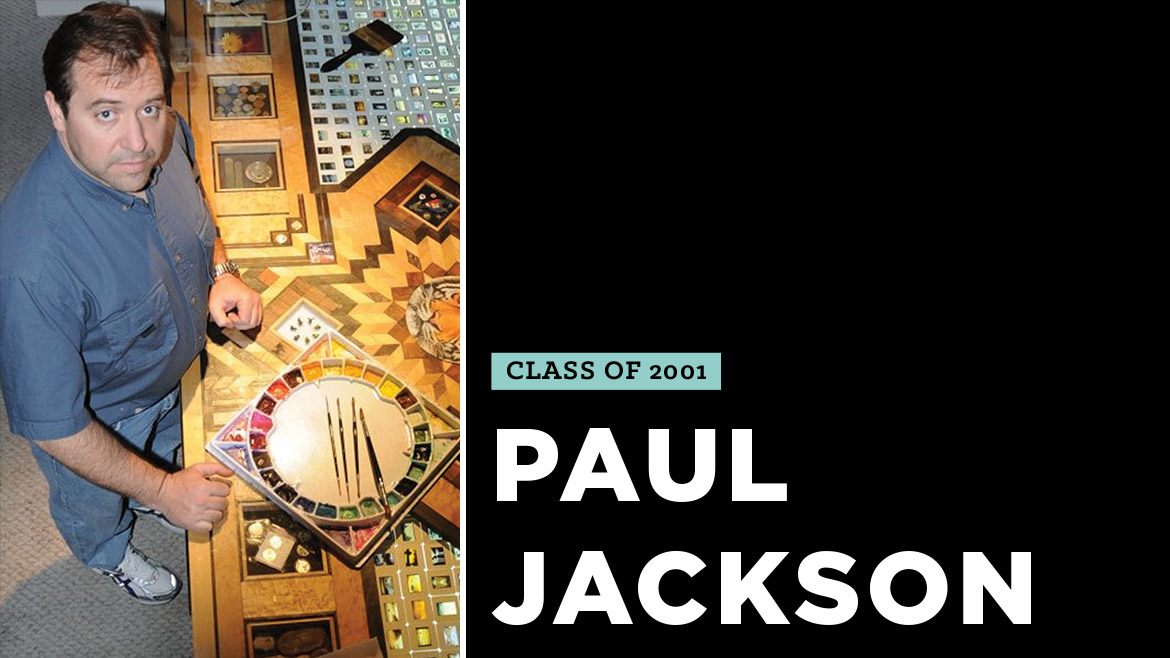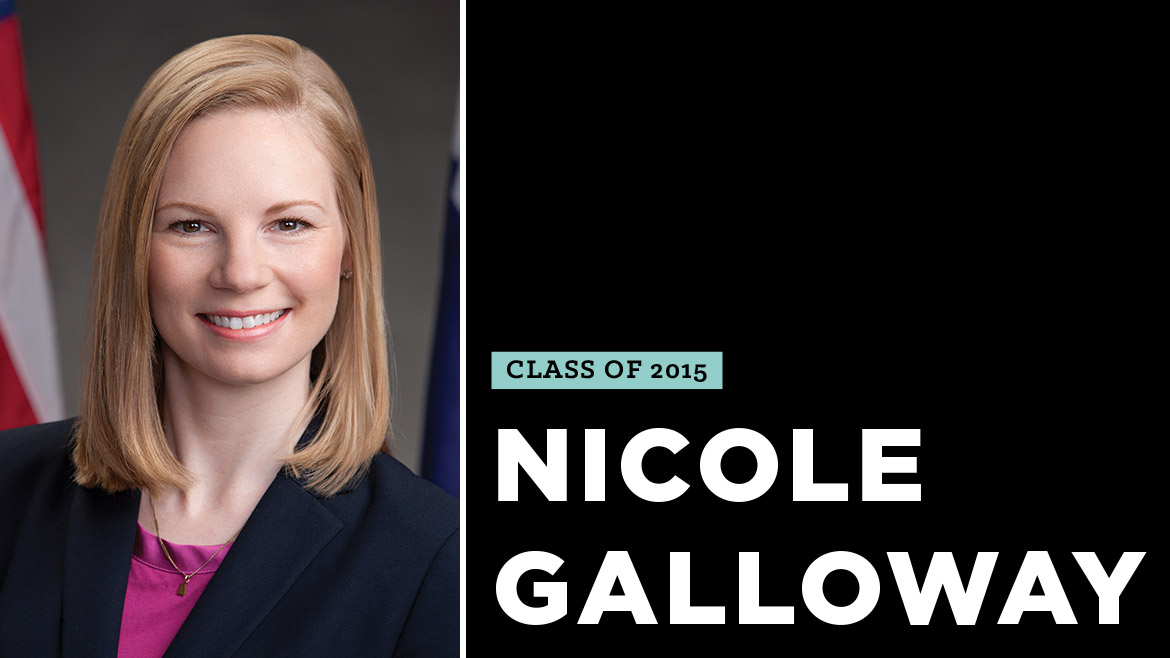20 Under 40 Alumni: Where Are They Now?

CBT’s 20 Under 40 is meant to be a celebration of people who are going places — for our 2018 issue, we caught up with three of our alumni to see where they’ve gone since joining the 20 Under 40 club. Turns out they’ve gone pretty far (literally and figuratively).

Paul Jackson, Class of 2001
Then: Artist
Now: Artist (but trust us, things have changed)
Fun fact: Jackson has designed Presidential Easter Eggs for the White House three times.
Technically speaking, Columbia artist Paul Jackson isn’t a 20 Under 40. During CBT’s first run at the awards, in 2001, we included 40 of Columbia’s top young professionals in the class, so Jackson is really a 40 Under 40 — though, even if we were only doing 20, Jackson probably would have made the cut.
At the time of his selection in 2001, Jackson had recently opened his own gallery, Illumia, with a staff of 12 people, and he was in the middle of working on “Tiger Spot,” a 30-foot, 300,000-piece mosaic of a tiger head that once took up a sizable chunk of Lowry Mall on MU’s campus. He was also working on a submission for Missouri’s state quarter design contest, which he would end up winning.
Sort of.
Change — in the big sense of the word, but also including coins — would become the defining theme in the next chapter of Jackson’s career. Over the next decade, he went public in defending the integrity of both of the headline-grabbing projects he was working on in 2001. He also found a new niche in the art community that now has him traveling around the world while keeping his home studio, “Avalanche Ranch,” in Columbia.
The quarters came first.
“Turns out, the mint engravers were ripping off America’s artists,” Jackson says. “I busted them at it and had to go protest a little bit.”
During the release of the state quarters series, the U.S. Mint encouraged states to hold design contests to drum up ideas. To Jackson, it seemed like a pretty simple concept: turn in a quarter design, have the state send it to the mint, and then get the design on quarters. But it turned out that the contests were nonbinding, and the designs the mint put on quarters often varied dramatically from the original designs they received. The design that Jackson sent in featured Lewis and Clark sailing on the Missouri River, coming through a lush forest with a bold rendering of the Gateway Arch in the background. The design that appeared on the quarter featured a bigger boat, more people, a thinner arch, and a sparser forest. Jackson led a group of protestors in Washington, D.C., rolling a gigantic quarter down the street outside the U.S. Treasury building with a reporter and photographer from the Washington Post by his side. Jackson and his supporters also put stickers with the original design on half a million quarters and put them into circulation, which Jackson says earned him the attention of the Secret Service. “Life got rather strange,” he says.
But not too long after, Jackson began getting offers to teach watercolor painting workshops in cities around the world: Budapest, Istanbul, Prague, Paris, London, and so on. When I called him for this story, he’d just returned from a trip to Australia and Indonesia, barely making it in time for the opening of an exhibit of his recent paintings at the Boone County Historical Society. In recent years, he’s shown a knack for Santa Claus portraiture, and he recently finished up a Santa painting for Coca-Cola.
While his workshop teaching career was beginning to blossom, he also battled with MU over “Tiger Spot,” which had become damaged due to either weather, as MU claimed, or vandalism and careless maintenance, as Jackson contended. Jackson sued the university under the Visual Artists Rights Act, saying they’d allowed the mosaic to become “distorted” and “mutilated.” The university ended up paying Jackson $125,000 to relinquish the rights to the work; they removed “Tiger Spot” in 2012.
For Jackson, the first decade of the millennium was a whirlwind, but one that ultimately clarified a new path forward. “I’m a lot older and wiser now, that’s for sure,” he says. “I’ve learned that smaller is better than bigger.”
The recent Boone County Historical Society show was a collection of workshop demos that Jackson never had time to perfect — in 2017, he finally found the time to put on the last touches on nearly 70 pieces. The collection is called “Unfinished Stories.”
“When you’re an artist and opportunity knocks, you have to keep following it,” Jackson says. “The one thing I’ve learned in three-plus decades of being an artist is that things don’t stay the same for long.”

Jennifer Bukowsky, Class of 2014
Then: Owner, Bukowsky Law Firm
Now: Political commentator, writer, and more
Fun fact: Bukowsky’s parents, Kevin and Kathleen Koboldt, met as freshman at MU and married in the campus chapel the day after graduation. All four of their children, including Bukowsky, have degrees from MU.
Jennifer Bukowsky’s 2014 20 Under 40 win came as she was establishing herself as Columbia’s premier criminal defense attorney. “I was just coming off a couple high-profile cases, so I was feeling good about that,” she says. “I think I was looking at expanding the law firm. Those were exciting times.”
In 2012, Bukowsky got the first not-guilty verdict on a murder trial in Boone County in almost 50 years. After her 20 Under 40 win in 2014, she would successfully free a client who had been wrongfully convicted of murder in 1993. A year later, The Bukowsky Law Firm, which she founded in 2010, moved to a new building in north downtown. (CBT named it one “Columbia’s Coolest Offices.”)
She’s been busy in the years since too, taking on additional duties as an adjunct professor of law and teaching the Innocence Clinic at MU’s law school while continuing to take on high-profile cases. She’s also become a respected voice in local and national politics, serving as a delegate to the 2016 Republican National Convention, in Cleveland, and as a member of then-Governor-elect Eric Greitens’ transition team after the election. Her Twitter account, @esqonfire, got verified around the same time — “which was crazy,” she says. Things were going good.
But in November, Bukowsky announced that she was closing her law firm. She’s ready to do something bigger. Whatever that may mean.
“I’m looking at several things,” she says. “I’m just not ready to say all of them just yet.”
Bukowsky is a self-confessed workaholic — in a 2013 CBT interview, she said if it weren’t for her husband, Veterans United Home Loans co-founder Brant Bukowsky, she’d “probably live alone with two malnourished cats and work 90 hours a week.” She’d occasionally sleep on a red couch in The Bukowsky Law Firm office to save time during trials. In the past few years, she’s been reflecting on her career ambitions and searching for ways to make more of a difference for more people. When her mentor, local attorney Milt Harper, suffered a heart attack in court in 2016, Bukowsky began wondering whether she wanted something different.
“When [Milt] had his heart attack in court and the fallout from that kind of killed any ambition I had to build and grow a law firm in Columbia,” she says. “And I was also inspired by other events to try to have a bigger impact in causes I care about, like criminal justice reform and liberty. And I decided a law firm was not the best vehicle to achieve those goals.”
Bukowsky has kept busy through the holidays, but she’s planning on having an eventful 2018. She’s now a regular columnist for the Missouri Times, a political newspaper, and she’ll be a contributing writer on criminal justice reform for the Show-Me Institute, a conservative policy think tank. “Time will tell if anything more comes out of that, but I’m excited to be working with the smart folks over there,” she says.
Bukowsky also hopes to increase her media appearances and do more writing with other groups and publications. But that doesn’t figure to be her biggest commitment. “There’s another project that I’m just not ready to talk about,” she says.
A quality of any 20 Under 40 winner, but particularly Bukowsky, is that they make every minute of their career count. Having already logged a successful career’s worth of criminal defense work in Columbia, Bukowsky’s hoping to make the most of a new career path, whatever that may look like.
I asked her if she had any advice for this year’s 20 Under 40 class. She does: “I would say that time — how would I phrase this? — everyone faces an ultimate deadline in life, and you really need to reflect on whether what you’re doing is what you’d like to do to meet the deadline you set for yourself, for your life and what you’d like to accomplish. It’s good to try to be reflective of that and aware of that and not let time slip by. Because it goes pretty fast.”

Nicole Galloway, Class of 2015
Then: Boone County Treasurer
Now: Missouri State Auditor
Fun fact: With the arrival of her third son, Joseph, last January, Galloway became the first statewide office holder in Missouri history to give birth.
In retrospect, CBT probably named Nicole Galloway a 20 Under 40 winner just a little bit too early.
It’s not that she was unqualified at the time — at the age of 32, she was already four years into her tenure as Boone County Treasurer, where she oversaw the county’s $55 million investment portfolio, and she was coming off her first election win. She had already instituted a new, more transparent debt management system that became, as we wrote at the time, “a model for other local governments throughout the state.”
It’s just that she added a pretty stellar line to her resume only three months later, when she was appointed state auditor by then-governor Jay Nixon. Upon her inauguration, Galloway, a Democrat, became the youngest woman to hold statewide office in Missouri history.
So her 20 Under 40 win probably wasn’t the highlight of Galloway’s 2015. But she still appreciated it. “What I remember is the other professional men and women in the group,” she says. “I admired their careers. I knew some of them personally, others I did not, so it was an honor to be part of such a great group of young professionals in Columbia.”
Galloway earned bachelor’s degrees in applied mathematics and economics from Missouri University of Science and Technology and her MBA from MU. Before becoming county treasurer, she worked as a CPA in St. Louis and Columbia, becoming a certified fraud examiner along the way. Her private-sector experience helped sharpen the skills she’s now using as state auditor, a position that demands more technical knowledge than many other political posts. “You have to be good with numbers and analytics,” Galloway says. “A lot of what we do is deal with large sets of data, looking for trends, looking for potential fraud, looking for anomalies, doing analytical reviews. You have to be comfortable with auditing concepts.”
Public officials often refer to the auditor’s position as “the taxpayer’s watchdog,” combing through public finances to ensure revenue is being spent reliably and responsibly. Galloway’s highest profile Columbia-related audit came last March, when she criticized the opaque bonus compensation practices for UM System officials, including former MU Chancellor R. Bowen Loftin. Her audit found the UM System paid roughly $2.3 million in what she called “inappropriate bonus payments” to executives and administrators through 2015, 2016, and the start of 2017. The UM System ended the executive bonus program the week following the audit. A couple weeks before we spoke for this article, an audit of the Cooper County Clerk’s office uncovered criminal misuse of taxpayer money, which led to the clerk’s resignation and subsequent guilty plea.
“My perspective is that people work really hard for their money, and they work hard to provide for themselves and their families,” Galloway says. “And when government at any level — from a small municipal court all the way to a state agency — is abusing the public trust and abusing the resources they have . . . it just makes me so mad and so frustrated. Through my role of the auditor, I can use my skill set to root out that abuse and root out that waste and stand on the side of taxpayers to make government work better.”
Galloway says she’s looking forward to staying in public service “for a long period of time” and using her background in economics and math (unusual for a politician) to bring a fresh perspective to public policy. This year will be Galloway’s first election year as auditor, which means she’ll add the rigors of statewide campaigning to her day-to-day duties in office. She’s currently the only Democrat in a state office in Missouri, but Galloway, like many state auditors before her, views her job as nonpartisan. “I am tough and I am fair and I am thorough,” she says. “When I go to work, I think about a couple things: my family, and people like me who are working to provide for their families and communities; and taxpayers. If a taxpayer was looking over the shoulder of government, what would they see? And what would they want to change to make the government work better for them? I think if you keep your head down and do those things, it kind of removes, in my mind at least, that political question.”


